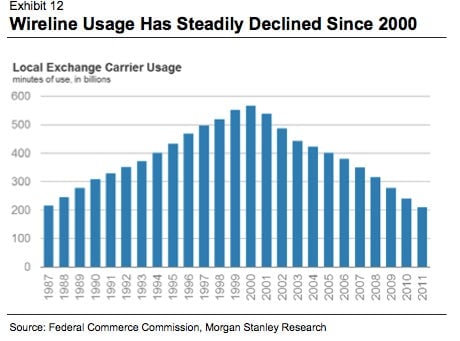Meet the “corders”: The people who aren’t ready to cut just yet
Cord-cutting is a well established phenomenon. Millions of Americans are abandoning cable subscriptions and landline phones in favor of internet television and mobiles.


Cord-cutting is a well established phenomenon. Millions of Americans are abandoning cable subscriptions and landline phones in favor of internet television and mobiles.
But there are also people who are happy with their landline connection and would very much like to hold onto it. “Corders,” if you will.
The Wall Street Journal reports that AT&T, wants to force customers in places like Carbon Hill, Alabama off its circuit switched (landline) phone network and onto either wireless or high speed internet based services. The telecom giant wants to upgrade its entire, 22 state landline network to be internet-enabled by 2020, the report says, and phase out landline telephony, which costs it billions of dollars a year to maintain.
Phone services would be delivered over its wireless network or over the internet, using voice over IP technology (similar to what is used by Skype). Which, presumably, people who only use their phone connection currently for old fashioned calls don’t want, may not need and could end up paying more for. And it’s creating uneasiness in Carbon Hill.
The problem is that wireless and high speed internet services in the US are not regulated anywhere near to the extent that old fashioned landlines are. For example, as the Journal points out, so-called “last mile” competitors get access to AT&T and Verizon’s fixed line networks at regulated rates, but they do not enjoy the same protection for internet based services. So, if corders are forced to make their calls over the internet or wireless, their bills may go up as a result.
The decline of the landline phone has been swift and widely reported. It’s even causing problems for political pollsters.

A government study last year found that 39.4% of American homes are now wireless-only when it comes to telephony. According to Pew Research, they are also disproportionately young (two thirds of adults aged 25-29 live in wireless only homes) and poor (56% of adults living below the poverty line live in wireless only homes).
Data on landline only homes is harder to come by. But the risks being faced by cord cutters and corders are essentially the same: higher bills for communications services. And they can both be solved by tighter regulation of America’s telecommunications giants. Recent experience suggests this is easier said that done.